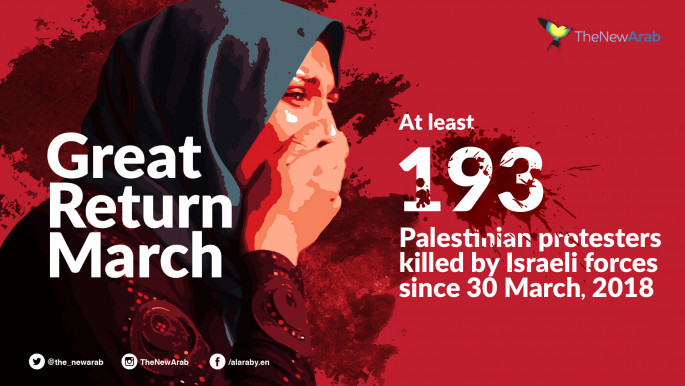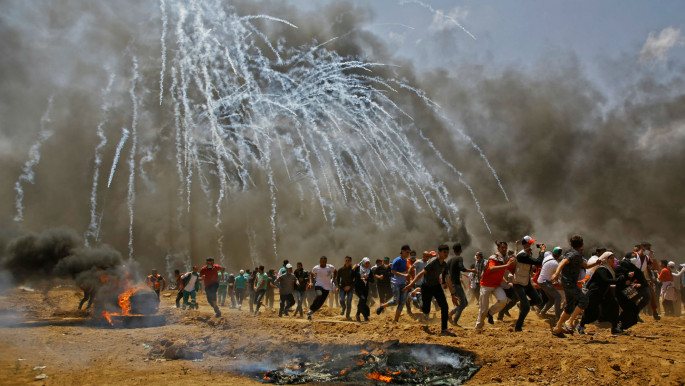
A deafening silence surrounds Israeli war crimes in Gaza
The three-person panel was made up of Kenyan legal and human rights expert, Betty Murungi, Bangladeshi lawyer, Sara Hossain and was chaired by Argentinian lawyer, Santiago Canton. It concluded that Israel had intentionally shot unarmed Palestinian protesters since March 30 during the Great March of Return weekly protests along the eastern fence of the Gaza Strip. Protesters were calling for the lifting of the 12-year Israeli siege on the coastal enclave.
According to the report, the vast majority of Gaza protesters who were killed by Israeli forces - 154 out of 183 people - had been unarmed, and "did not pose an imminent threat of death or serious injury to others when they were shot, nor were they directly participating in hostilities".
The commission - known as the UNHRC Independent Commission of Inquiry on the 2018 Gaza protests - found that 35 children had been killed, some from direct weapons fire. The commission also noted one case involving a wheelchair user and direct fire at journalists who were clearly identified as press.
"There is no justification for shooting children and disabled people that pose no risk," said Hossain.
Murungi called on Israel to lift its blockade of the besieged coastal territory to allow medical supplies in, and to grant exit permits to Palestinians seeking medical assistance abroad.
The Israeli government, as with previous UN investigations, refused to cooperate with investigators, and rejected the report's findings.
 |
For over 50 years, the international community, including the UN, has refused to take effective action against Israel |  |
This isn't the first time that a UN report has accused Israel of committing war crimes. A UNHRC inquiry into Israel's 2008-9 Operation Cast Lead found Israel guilty of war crimes and crimes against humanity.
In 2017, a report published by the UN's Economic and Social Commission for Western Asia (ESCWA), found that "Israel has established an apartheid regime that dominates the Palestinian people as a whole". For the first time, a UN agency found Israel guilty of practicing apartheid - as defined in the UN Apartheid Convention of 1973 - against the Palestinian people.
Apartheid is a crime against humanity.
UN secretary-general Antonio Guterres had the report removed from the ESCWA website and told commission head, Rima Khalaf, to withdraw the report entirely. Khalaf stood by the report and resigned. There was no outcry about the report being buried due to political pressure being exerted on Guterres.
 |
|
For over 50 years, the international community, including the UN, has refused to take effective action against Israel.
Resolutions are passed; we condemn and we deplore. In some cases, ambassadors might be temporarily recalled. But there has been no serious, sustained demand for accountability, justice, and an end to Israeli impunity.
Is that going to change? Murungi, Hossain and Canton recommended that UN members consider imposing individual sanctions, such as a travel ban or an assets freeze, on those identified as responsible for the violations of international law and possible war crimes.
 |
There has been no serious, sustained demand for accountability, justice, and an end to Israeli impunity |  |
The panel also intends to hand over a confidential file with the identities of those who are believed to be responsible for these violations to UN human rights chief, Michelle Bachelet. Bachelet could hand it over to the International Criminal Court and national authorities.
This panel and their findings have provided the UN with a valuable opportunity to - finally - do what is right and take action against Israel.
 |
|
| The Great Return March began almost one year ago [Getty] |
While this is a real opportunity to act with a sense of urgency, global leaders have, so far, remained silent on the committee's findings and recommendations. Only UK Labour Party leader, Jeremy Corbyn, has called for an arms embargo on Israel.
At the time of writing, even South Africa's Department of International Relations and Cooperation had yet to issue a statement about the UNHRC's finding that Israel may have committed war crimes.
South Africa, which now finds itself at the UN Security Council, should be particularly interested in the committee's findings since Pretoria withdrew its ambassador after Israel killed more than 60 Palestinians on 14 May alone, a bloodbath that has been frequently compared to the Sharpeville massacre.
For over 50 years, the world has given Israel the power to decide when will be the right time to respect international law and end the occupation. Israel has never found the "right" time, and has asked the world to wait. Half a century later, and "wait" has now come to mean "never".
The time is now for the UN to move beyond its symbolic gestures and translate its words into action. Failure to do so simply indicates to Israel that it may continue with its occupation, colonialism and apartheid with no repercussions.
Attaining human rights for Palestinians has been postponed for far too long, and justice delayed, is justice denied.
Suraya Dadoo is an independent writer based in South Africa.
Follow her on Twitter: @Suraya_Dadoo
Opinions expressed in this article remain those of the author and do not necessarily represent those of The New Arab, its editorial board or staff.




